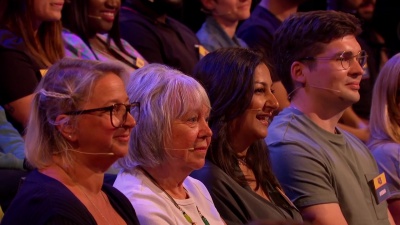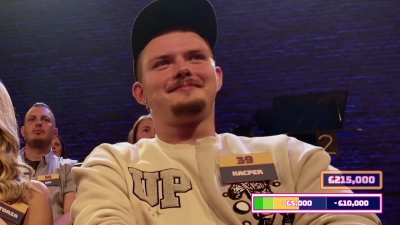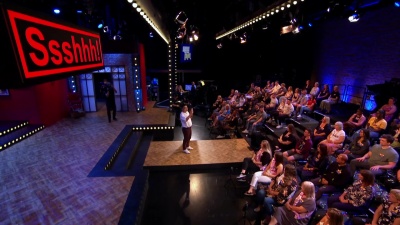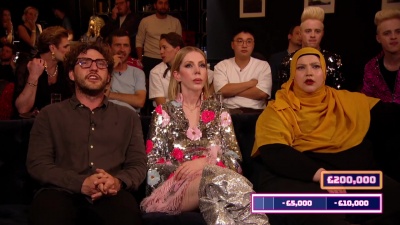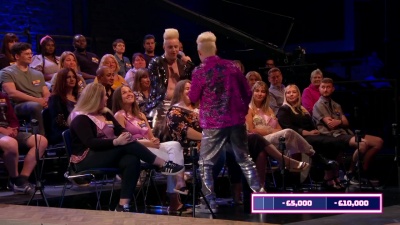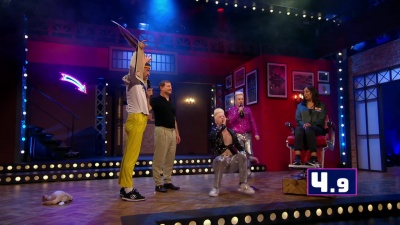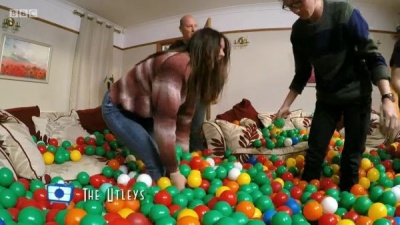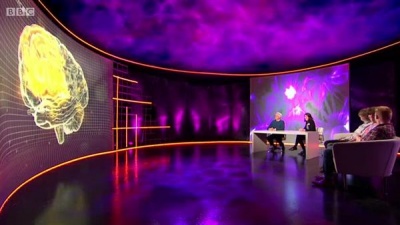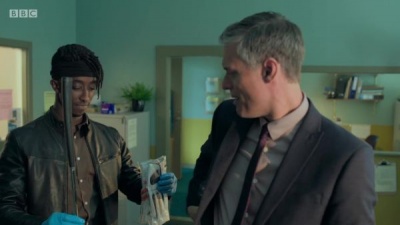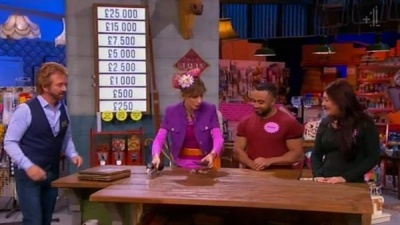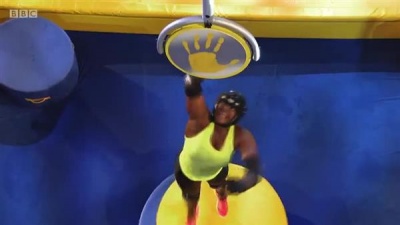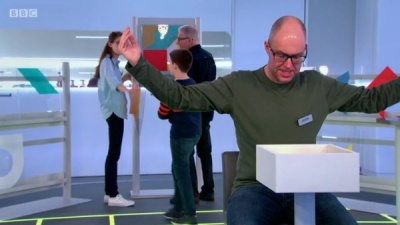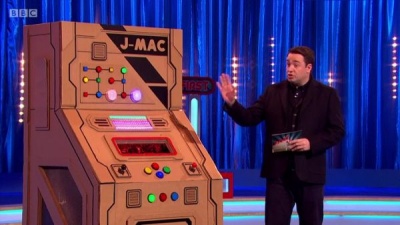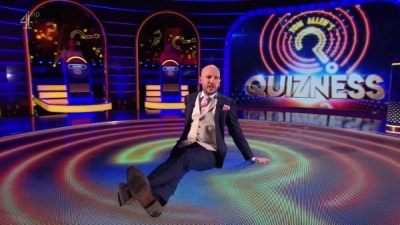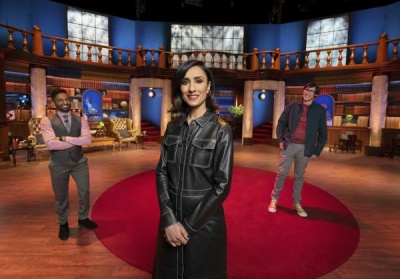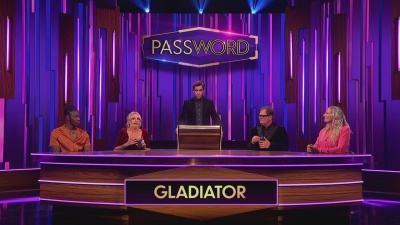Weaver's Week 2025-06-08
(Created page with 'Last week | Weaver's Week Index | Next week <div class=square style="float:right;clear:right;"> [[Fil…')
Current revision as of 09:44, 8 June 2025
Last week | Weaver's Week Index | Next week
What happens if a comedy performance happens, and nobody laughs? The Dave channel, home of things that fall flatter than this column's singing, finds out.
Contents |
Silence is Golden
Yes Yes for UKTV, shown on the Dave channel, 5 May – 9 June
A group of about seventy people are invited to a theatre. They're given £250,000 between them, and asked to watch some comedy performances. However, there's a catch. Every time someone makes a noise – a snigger, a guffaw, chortle, applause, cough, yawn – whatever the noise, it'll cost the group £5000. Twice as much if it's a "big noise", loud and/or prolonged. Whatever money is left at the end of the routine will be split evenly between the audience.
Silence is Golden trumpets its eye-watering jackpot, and says less about the way it's split seventy ways. That comes out at about £3500 each, with each noise costing the group £70. Average wins are in the low-to-mid hundreds of pounds per head.
To persuade the audience to titter and giggle, they bring on all sorts of comedians. Katherine Ryan, Seann Walsh, Fatiha El-Ghorri are regulars. And they get in some high-profile guests – Jedward, Suzi Ruffell, Amy Gledhill. A jaw-dropping array of talent.
Yet the idea is for the audience to remain silent. Not a smirk, barely a gasp of air. It's like hearing a comedian tell jokes and they all miss the mark. Not funny, not entertaining, not even bad enough to be heckled. Just, nothing.
There's an all-or-nothing finale, because of course there's an all-or-nothing finale. One member of the audience is given a minute with three of the night's entertainers; if the audience member makes a noise in that minute, everybody loses everything. Not that this has ever happened in reality.
Silence is Golden does feature some laughter, but it comes from the green room backstage. We the viewers are given hints about where to laugh, we can make some noise even if the studio audience is utterly silent. But there's no denying that the effect is weird, disconcerting, discombobulating.
There's no surprise that Silence is Golden comes from the mind of Richard Bacon. You'll remember him from I Literally Just Told You, a quiz where many of the questions were written as the show progressed, and where anything could happen – and often did. There are similar surreal moments on Silence is Golden, such as a woman coming into the studio saying she's lost her car keys, and also lost her clothes.
Other regular features include some embarrassing revelations – is it worth paying £5000 to not hear your step-dad discuss what he's doing with your mother? There's a regular conveyor belt of prizes, someone could pay £70 for a week at a château in the Loire if they're prepared for all the audience to stump up cash as well. And there are temptations – a personalised song from Deal or No Deal researcher Robbie Williams but only if you make a peep.
Now, the idea of working in silence is not new for television. Silent Library had a short run on one of the diginets over here, and that show's makers Nippon TV had some international success with Mute It. These shows worked because they were funny, and the comedy came from people stifling their natural urge to shout and yell. Silence is Golden certainly shows us lots of people stifling their reactions, but the comedy comes from professional comedy people and entertainers. It's a more assured way of making fun, and by being more assured feels less risky and less dangerous.
Richard Bacon has grown up with television, and done a lot of growing up on television. He's immersed in the medium's culture, and is able to question some of the stereotypes and assumptions that lie beneath it. Silence is Golden takes the assumption that comedy on television needs a laugh track, and says – what if we show comedy where nobody laughs? What if we do embarrassment where there's no sound, only the look on people's faces? It's an interesting question and a worthwhile experiment.
"Interesting question" and "worthwhile experiment" might make for a decent one-off show. It hasn't translated into a successful series. After releasing all six episodes on the UKTV Player, viewing figures for the linear transmission have been minimal, and they were shunted off into a late-night slot. We don't expect another run of this series; we do look forward to the next interesting idea to come from the fertile head of Richard Bacon.
One Series Wonders
Doesn't look like we're getting another series of Silence is Golden. It'll join the list of shows that never got the recommission – some very decent, some that were ixnayed through circumstance, some that just didn't find their audience. Here are nine other one series wonders from the past ten years, with comments mostly from the Bother's Bar / UKGameshows end of year polls.
The Button (2018)
"Without a doubt my favourite new 2018 show. Taskmaster with members of the public instead of celebrities. Inventive games, Alex Horne's voiceover is hilarious, and though the show isn't afraid to wind up contestants by pointing out their mistakes, somehow we still feel like the show is on their side and that we're cheering them on. A masterclass in good framing."
"I just really enjoyed this. Gogglebox for Gameshow, and it was just fun. Didn't feel too similar to Taskmaster and the shots of people missing the button turning green were always funny. Inventive and clever tasks as well."
Many of the games were simple and inventive, using everyday household items. We wonder if the folk behind 99 to Beat are interested in reviving this format.
Beat the Brain (2015)
"Good to see a puzzle show and this worked well. In particular Josie Lawrence being live as the Brain and the amount of different games helped with new games still being introduced about half way through the series. Fitted teatime well and would like to see it back."
"Just got hit with a sudden wave of nostalgia for Beat the Brain. I hold fond memories of watching it and trying to play along while my younger sister tried to steal the remote so she could watch the Danger Mouse reboot."
Perhaps a little too didactic for primetime, perhaps this is worth another look given the success of The 1% Club.
Armchair Detectives (2017)
"On paper sounded very dull, but an enjoyable 45 minutes overall. Susan Calman really helps making this show what it is.
"Probably the only show that I actively seemed out to watch all the episodes. Susan was brilliant, the contestants were very enjoyable and actually quite good at guessing the killer. Hopefully, if there is a second series, Susan will get a notebook and be able to officially guess the killer herself."
Another show that could have run for years, but got taken off for, um, Chase the Case. Speaking of shows that didn't quite land:
Cheap Cheap Cheap (2017)
"An interesting swing and a miss and worth a try, format issues aside (and it had many), making the show effectively a sitcom proved divisive, with the dividing line somewhere around how much you liked Trevor and Simon on Going Live."
"Sat for an age on the shelves of the Channel 4 warehouse and at first watch easy to see why. The gameshow element was too weak to shoulder the weight, and the improv comedy was at times just not funny enough to paper over the cracks in the flimsy conceit. When it worked, it worked. When it failed to – it stank the place out."
"Burn of the Year goes to Cheap Cheap Cheap cheap shot at itself as early as episode three:
- Kelly: So, is this the same game as yesterday?
- Noel: Sorry?
- Kelly: ‘Cus are you just going to do this all the way through, just guess which is cheapest?
- Noel: Yeah, that’s the game.
- Kelly: I don’t think people will watch it, Noel, but give it a go."
The Italians do a great line of shows with lots of Stuff and Business happening, skits and stuff that isn't the main game, but adds value to the viewer. Cheap Cheap Cheap had all the Stuff and Business, but the game was nothing. Not even Noel Edmonds could save it.
Can't Touch This (2016)
"Total Wipeout, Poundland edition. They may have milked that cow dry, yet they still keep trying, with any charm or atmosphere cut out by making every obstacle the same, setting the entire thing in a bland warehouse, and making the entire premise of the show (i.e. touch the prize and you win it) only actually hold true in the one final jump at the end."
"They had an obstacle that was impossible to beat and even told us in the VO that nobody had been able to beat it in testing. Why put it in the show then?"
A big dumb physical game, on Saturday teatime, but it's not Gladiators. The BBC really ought to bite the bullet and bring Gladiators out of – what? Oh. Good.
The Family Brain Games (2019)
"A very wholesome competition, Family Brain Games felt part puzzle book, part science lecture, and part family documentary. On their own, none of these pieces would be particularly enticing, but together they make a show that feels like a celebration of teamwork and intellect without being preachy or arrogant."
"I enjoyed this a lot. The games were well designed and the perfectionism of some of the younger contestants made me wince in recognition. The presentation was appropriately generous, Dara O'Briain also excellent."
Another show of great promise, apparently only ever commissioned for the one run.
First & Last (2020)
"I imagine I’ll be one of only a few giving First & Last their dues, long left on the shelf, and wandering the planes of development hell long before that, the show has a simple premise and feels like it’s trying to follow in the footsteps of Saturday night variety shows of the Forsyth era. While Manford veers a little too much on the side of sardonic, it remains a show that kept my attention on a Saturday night, something that more revered shows have failed to do so."
"The core idea here is pretty robust, and they managed to spin it out in a reasonable number of different directions for the different rounds across different episodes."
Really deserved more than the one series; Jason Manford at his best, games to play along at home, and surely a second series would have had a couple more ideas. Skewered by The Masked Singer and by the health crisis.
Quizness (2021)
"Nice formats that you wouldn't see in other game shows. Added a bit of flair to the regular game show genre and was nice to be able to play along with them at home."
"This is what the primetime version of House of Games should have been like – the silliness of this is endearing, and actually makes it more difficult – the endgame in particular. Tom Allen's comedy shtick can grate on me, but it actually works well for this show."
We're going to discuss Genius Game next week, with reference to the way it was rarely fun. Quizness mastered light and shade.
The Answer Trap (2021)
"One of the most stylish and well-polished first runs of any quiz formats in recent memory. Anita, Frank, and Bobby played off each other wonderfully, the questions were modern and interesting, and the gameplay (the alphabetisation gaff aside) was really fun to play along with. It's a total embarrassment on Channel 4's part that The Answer Trap will seemingly never get a second outing."
"For competitive quizzers, this was an ideal format – Bobby and Frank's eccentric personalities and mini-competition made it compelling viewing, it was very underappreciated."
"Only Connect on daytime TV and !mpossible on steroids. A genius concept with a genius execution. Ask two pairs of contestants to spend some time in an HD version of the Hypothetical studio trying to sort answers into groups while trying to avoid traps cleverly set by Bobby Seagull and Frank Paul, with Anita Rani playing the role of an excellent host. Shame it's not coming back."
The show didn't return, but the idea did – find the truths, avoid the traps is basically the idea behind BBC1's successful Bridge of Lies.
In other news
The tenth item we had for the last article appears to not be a one series wonder: ITV has asked for more contestants to play Password, Stephen Mangan's game of words and parsing. At the right length – nearer 30 minutes than 45 – it's adequate entertainment.
We also hear that Disney wishes to make a new series of Blind Date, the dating show where contestants swap heavily-scripted single entendres. It's the sort of show that a streaming platform can make cheaply, use internationally, and it'll accrete small audiences over a long period.
Unlikely scenes on Who Wants to be a Millionaire, where a contestant played the million pound question, and got it wrong. That he still left with £125,000 meant the loss wasn't as big as it would have been originally, and perhaps both detracted from the tension and made him more likely to play.
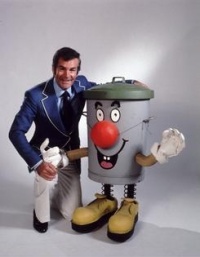 Ted Rogers with the Fifteen-to-One mascot. (Yorkshire)
Ted Rogers with the Fifteen-to-One mascot. (Yorkshire)
Entertaining scenes on Bridge of Lies, where a contestant thought that Dusty Bin was the mascot of Fifteen-to-One. Naah, that was the Parthenon Marbles.
And we hear that the Bloomsbury Museum has agreed to "permanently loan" the Marbles back to Athens, from where they were removed a couple of centuries ago by Thomas "Lord Elgin" Bruce. We suspect that William G Stewart would be very pleased.
Soccer Aid is ITV's big summer charity appeal, and they make special editions of game shows – Deal or No Deal and The 1% Club (yesterday, check ITV Hub), and Riddiculous (Fri). The match is next Sunday
The ITV Quiz channel launches on Monday, with most of the shows we'd expect – but there will be beastly reactions as The Chase is not present. It has an internet stream on ITV Hub.
And it's the 24 Hour Game Show Marathon (the internet), a full day of lovely people making great entertainment in ways that might (for copyright reasons) bear a slight resemblance to other ideas we love, and raising lots of money for charity.
To have Weaver's Week emailed to you on publication day, receive our exclusive TV roundup of the game shows in the week ahead, and chat to other ukgameshows.com readers, sign up to our Google Group.


